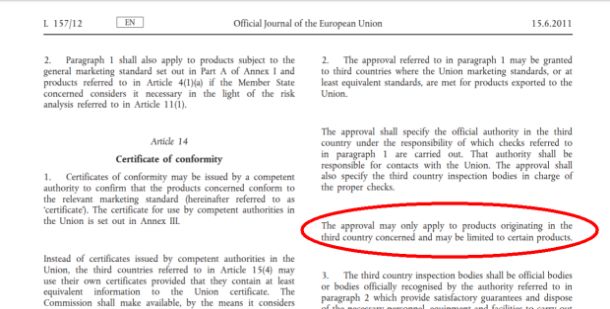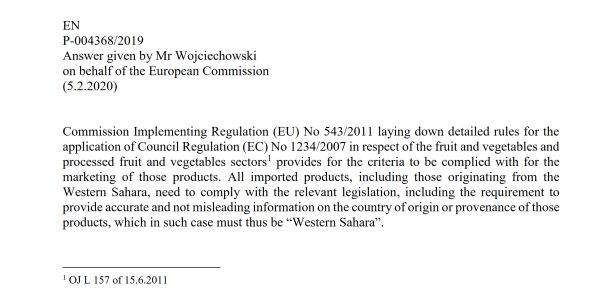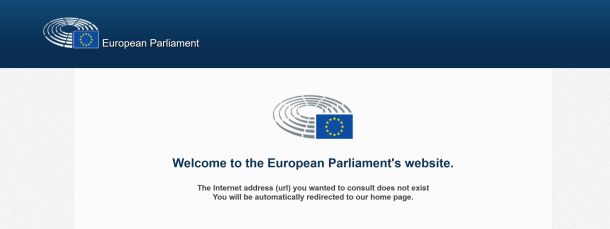
What is EU's position on labelling of products from occupied Western Sahara? The EU Commission has now for the third time published a response to a parliamentary question on the matter, but the latest version fails to address the question.
The EU Commission yesterday, 17 March 2020, for the third time published its answer to a parliamentary question on labelling of and conformity checks on products from Western Sahara that was asked last month. This time, the EU Commission has managed to miss the point entirely.
Western Sahara Resource Watch has previously reported that the Commission on 5 February had very precisely responded to a parliamentary question on the matter, but that the text mysteriously had been removed later on, then republished, then removed again. The originally published statement from the Commission had clarified that products from Western Sahara should be labelled a such.
However, the new answer to the question published yesterday has been altered to something totally different, failing to respond the question that the Commission had been asked. The very clear message from the earlier version of the answer has been totally removed.
The new answer only states that Morocco is responsible for carrying out checks on conformity to marketing standards of fresh fruit and vegetables under their supervision.
However, that is not an answer to the question that MEP Heidi Hautala (Finland, Greens/EFA) had submitted on 11 December 2019. She referenced EU case-law establishing that Morocco has no sovereignty or jurisdiction over Western Sahara, and asked whether in view thereof, Morocco's conformity checks of products from Western Sahara are in line with EU Regulations and what the labelling of origin on such products should be.
The Commission has now answered neither of those questions.
Regarding Morocco's conformity checks on products originating in Western Sahara, the Commission refers to Article 15.4 of Commission Regulation (EU) No 543/2011, and says that "Morocco is one of the third countries where the conformity checks have been approved by the Commission. The Moroccan authorities are responsible for carrying out checks on conformity to marketing standards of fresh fruit and vegetables under their supervision and those authorities are responsible for contacts with the Union.”
But that very same Article of that very same Regulation - albeit in point 2 - states that "The approval may only apply to products originating in the third country concerned".

Since EU case-law is clear that Morocco has no sovereignty over or international mandate to administer Western Sahara, and that Western Sahara must be regarded as a territory that is "separate and distinct" from Morocco, it is evident that Morocco cannot perform conformity checks on products originating in Western Sahara. It can do so in its own national territory, as internationally recognised and accepted, but not in Western Sahara.
The question about labelling has not been covered at all - unlike in the two previous versions, which elegantly and adequately answered the question.
"All imported products, including those originating from the Western Sahara, need to comply with the relevant legislation, including the requirement to provide accurate and not misleading information on the country of origin or provenance of those products, which in such case must thus be 'Western Sahara'", the Commission responded the first time, on 5 February 2020.
Not even 24 hours later, all traces to that statement had been removed from EU websites.
Then on 19 February 2020, the Commission published the statement again, without any changes and thus identical to the one made public two weeks earlier. Two days later, the statement had once again disappeared from the EU websites.
"Since the EU Commission has now published an answer on EU-Western Sahara trade that does not address the question at all, we fear that this statement will be the definitive answer and don't expect it to be removed any time soon", stated Western Sahara Resource Watch coordinator Sara Eyckmans.
WSRW urges the EU Commission to repost its initial answer, as that was in fact an actual response to the question asked.
In case this answer is also removed, it can be downloaded for future reference here (pdf (31 KB)).
Why does this EU statement keep disappearing?
A clarification by the EU Commission on labelling of products from Western Sahara was published, then removed, then published again and has now been removed again from EU websites.
EU reaffirms: Western Sahara products to be labelled as such
Two weeks ago, the EU Commission announced that products from Western Sahara should be labelled accordingly, only to withdraw that statement the very next day. Today, the Commission reaffirms its original position.
Spectacular backtracking by EU Commission on Western Sahara labelling
On 5 February 2020, the EU Commission announced that products from Western Sahara should be labelled accordingly. But about 24 hours later, all traces to that statement had been removed from EU websites.
EU consumers, like Saharawis, ignored by EU lawmakers
The proposed trade scheme for occupied Western Sahara denies EU consumers the right to know the true origin of covered products, just like it failed the right of the people of Western Sahara to decide whether they wanted the deal in the first place.


